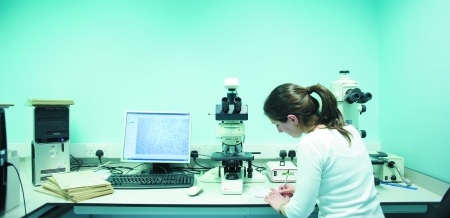
June 24, 2013, by Zoë Goodwin
Me, some research & a blog – The clinical Series: Engaging the patients
Welcome to the third post in the Clinical Series. This series was born when my work in the communications team generated an enthusiasm to learn more about the work of the academics who have crossed my path. This blog created the opportunity for me to do a little further investigation, to delve deeper into the science and to share my findings with you. Enjoy this post and look out for the next one later this week.
Many scientists who are responsible for life-changing research are often found in their labs, heads down and hard at work. In this clinical series I have come across many great academics who have gone beyond doing the science to engaging their findings with the public. Cystic Fibrosis (CF) scientists here at the University have also done just that.
CFUnite.org, a website developed by a team led by Dr Matthew Hurley, clinical lecturer, allows CF patients to access the latest research findings about their condition, volunteer for clinical trials and influence the direction of future scientific studies. The programme was set up with a Wellcome Trust People Award of £29,624.
CF is an inherited condition affecting 9000 people in the UK and 70,000 worldwide – it is one of the UK’s commonest life-threatening inherited diseases. It is caused by a faulty gene that controls the movement of salt and water in and out of the cells in the body, which leads to the internal organs, especially the lungs and digestive system, becoming clogged with thick sticky mucus. It can cause impaired growth in infants and chronic lung infection later in childhood.
Dr Hurley said: “We’re really trying to help researchers connect directly with people with cystic fibrosis, not through newspapers or press releases, but directly themselves. We’re critically keen then for people with cystic fibrosis to engage with the research process – letting researchers know what their research means to them and what the future research priorities should be.”
CF Unite has now streamed two national conferences and one web event and has another planned. Around 100 people took part in each event online and in total the site has had over 7,500 visits from over 4,500 individuals.
The research contribution to CF cannot be gone without a mention itself. Treatment for CF requires frequent and prolonged courses of intravenous aminoglycosides – antibiotics that can cause kidney damage. Professor Smyth, a CF expert, was able to show that a once daily aminoglycoside dose is less toxic than multiple daily doses, but is equally effective.
These findings have informed clinical practice guidelines nationally and internationally. From 2002 to 2006, the use of once daily aminoglycosides rose from 17% to 68% in the UK.
The impact of this research has been massive. Patients with CF are now at a reduced risk of a serious treatment related complication; clinicians can deliver effective care without comprising safety; and those who commission healthcare can now pay for an intervention which is no more expensive but which has a lower risk of a complication. These complications require expensive and resource intensive management such as dialysis and kidney transplant – the cost of dialysis for acute kidney injury in CF is around £3,500 for an eight day course of dialysis.
So not only is this team of expert scientists delivering life-changing research, they are also committed to engaging with their patients; providing them access to the latest findings and with the opportunity to have their say. This I think is vitally important and should be practiced more widely.
No comments yet, fill out a comment to be the first

Leave a Reply